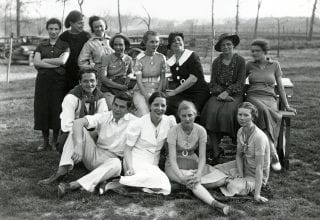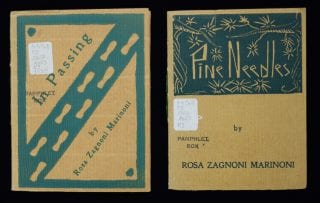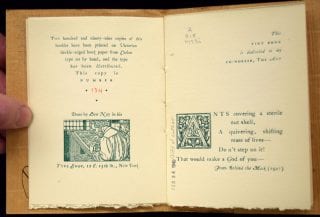Special Collections will celebrate National Poetry Month 2019 with an exhibit honoring Arkansas’ own Rosa Zagnoni Marinoni. This post was contributed by Hannah Bradley, a candidate for an MFA in poetry and Special Collections intern.
Materials in connection with Rosa Zagnoni Marinoni, the longtime Fayetteville resident, will be on display in Special Collections this April. She was an important figure in Arkansas because she promoted poetry appreciation through the founding of the first statewide Poetry Day, and was the state’s Poet Laureate for many years. Rosa was known in Fayetteville because she founded the University City Poetry Club that met, often at her home, to discuss and promote poetry writing in the community starting in the 1920s. The club was active for about 40 years. Rosa and the community of poetry writers in Fayetteville were widely published in national and local magazine and journals, but they also self-published and distributed their own writing within writing circles.

Even though she wrote in the forward to Arkansas and Oklahoma Poets that “a poet’s worth must be gauged by the national or international renown which his or her work enjoys,” it is clear that Rosa was not only interested in gaining national recognition (Harrison 8). Indeed, in the same forward, she lamented that “Arkansas is not known as a ‘poet-producing state,’” but went on to shamelessly promote the work of her close friend Richard Leon Spain as the next big name in Arkansas poetry (8). Even though the anthology only includes 13 Arkansas poets, Rosa seems to suggest that there should be space for many more in the hearts of those who appreciate poetry, even if those poets do not enjoy national recognition.
Indeed, even though she was widely published with poems appearing in such publications as Mid-West Review, Lariat, New York Evening World, and Bozart, she also took the time to self publish on a smaller scale. She was invested in a more personal publishing practice that involved commissioning small books of poetry and then distributing those works of art as gifts. In particular, the Special Collections department houses two beautiful small books that were hand-made by a type setter called Lew Ney. These little books, titled Pine Needles and In Passing, set with green ink, were made in batches of 299, and presumably either sold individually or handed out to a selection of people important to the author. Pine Needles states, “This tiny book is like affection. It is not sold, and given only to a few.”

There has been little information thus far uncovered about Rosa Marinoni’s connections to the publisher, Parnassus, or Greenwich Village. However, the type setter that she must have been in contact with was of some fame in the area. In an article written for the Princeton University Library Chronicle, Julie Mellby wrote about this eccentric shop owner and his little-remembered biography. The Princeton Library houses many of the lasting archives of this man’s life and his role in the literary world of Greenwich Village. His accomplishments include the establishment of the first National Poetry Exhibition: an art gallery type display of poetry selected from submissions (Mellby).
As it turns out, Lew Ney’s real name was Luther Widen, but “the thirty-year-old doctoral candidate abandoned his research in psychology, adopted the pseudonym… (pronounced “looney”), and moved to Greenwich Village” (Mellby 65). As someone who was invested in the circumstances of the mentally ill, he acted out, and sometimes committed small crimes to gain access to hospitals for the criminally insane and interview patients (66). Upon moving to Greenwich Village, however, his interests seemed to turn to the artistic. After some time spent in odd jobs, and a brief run-in with the law that resulted in a rule of exile that did not stick, Lew Ney found a passion for publishing.

He took commissions from writers, and published his own newsletters about the village that discussed Bohemian happenings of interest. Due to his eccentricities and generosity (he and his wife Ruth helped to uphold the spirit of the area during the Great Depression via cultural events and cooking meals for the community) Lew Ney was deemed the unofficial mayor of Greenwich Village, and he also became known for his exquisite printing abilities.
The two Rosa Zagnoni Marinoni books printed by Lew Ney are “printed in Victorian deckle-edged book paper from Caslon type set by hand” (Marinoni). It is clear that a lot of care was taken with the printing and binding of these books that are delicate and declare themselves as works of art to be treasured.
Even though we do not know whether Rosa Zagnoni Marinoni and Lew Ney ever met, they must have has some contact in reference to the two publications she commissioned from him. Marinoni also includes The Greenwich Village Quill in the list of acknowledgements in at least one of her books. This magazine was a short-lived, local publication, which implies that she must have spent some time in the area or at least had some interest in the community of artists that lived there. Rosa is primarily associated with Arkansas, but there is evidence that she was invested in putting Arkansas on the map of poetry contribution, and that she may have had a hand or presence in another literary community all the way across the country.
References and further reading:
Harrison, Henry, editor. Arkansas and Oklahoma Poets: An Anthology of 29 Contemporaries.
Henry Harrison Publisher, 1935.
Mellby, Julie. “The True and Honest Story of Lew Ney, Greenwich Village Printer.” The
Princeton University Library Chronicle. vol. 75 no. 1, 2013, pp. 65-96. JSTOR, DOI: 10.25290/prinunivlibrchro.75.1.0065
Marinoni, Rosa Z. In Passing. New York: Parnassus, 1930. Print.
—. Pine Needles. New York: Parnassus, 1929. Print.
—. Radici Al Vento =: Roots to the Sky. Milano: M. Bazzi, 1956. Print. (Photo of Rosa)
Williams, Nancy A, and Jeannie M. Whayne. Arkansas Biography: A Collection of Notable
Lives. Fayetteville: University of Arkansas Press, 2000. Print.
